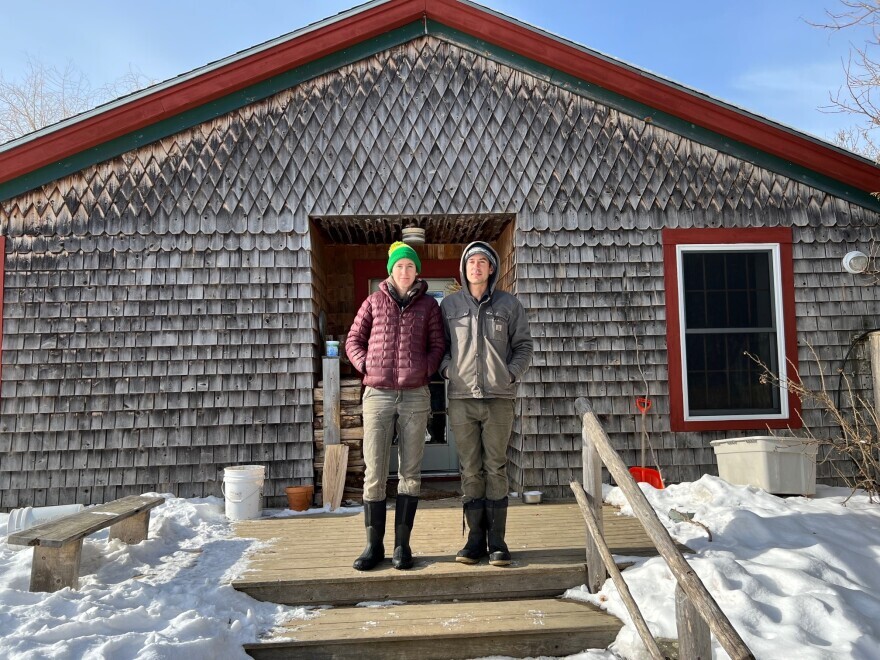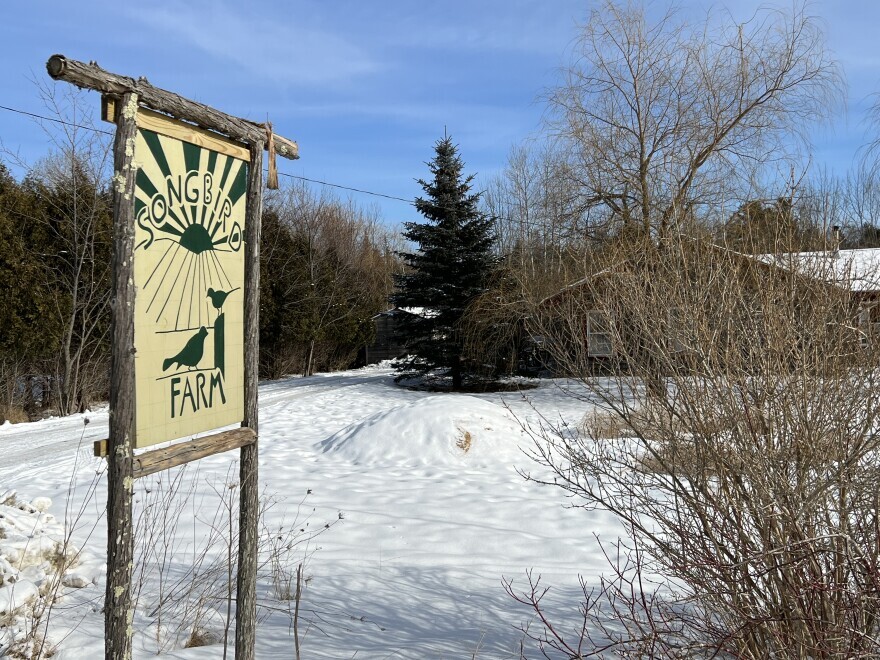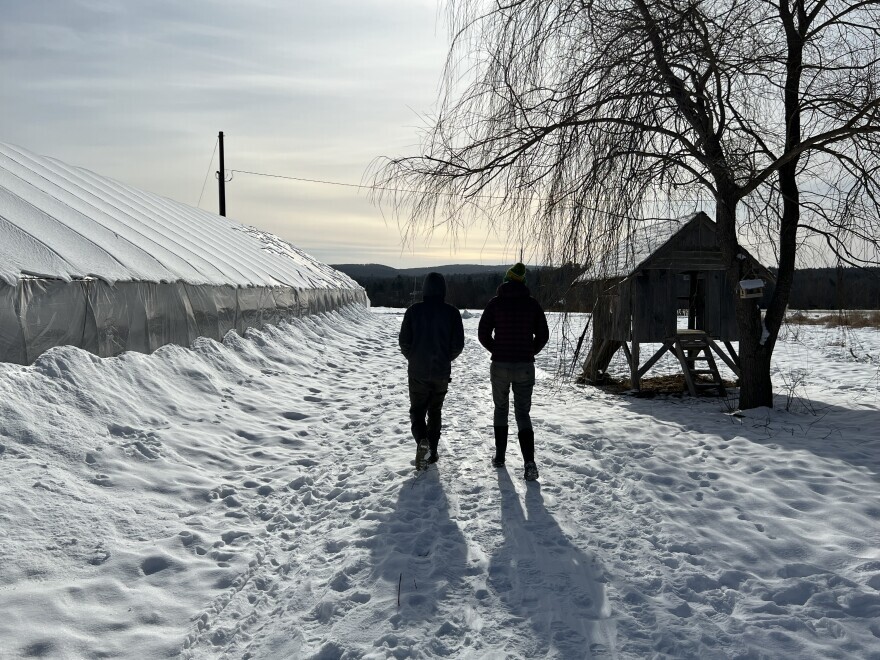In Maine, ‘forever chemicals’ are upending this family farm

Johanna Davis and Adam Nordell stand outside of their house at Songbird Farm, an organic vegetable and grain farm they have operated since 2014 in Unity, Maine. (Kevin Miller/Maine Public)
The temperature had finally crept above zero on a recent morning as Johanna Davis and Adam Nordell walked along the snowy path leading to one of three greenhouses on their organic farm in Unity, Maine.
The unheated, 3,000-square-foot greenhouse was less frigid, but still cold. Adam sang the praises of spinach as Johanna pulled back fabric to reveal rows of baby plants growing in the middle of a winter.
Click here to listen to the radio version of this story from Maine Public.
“Spinach is amazing,” Adam said. “Spinach can just hang out in the bone-cold frozen soil at 15 degrees below [zero] and once it warms up, it is able to move water around and perk right up. And it’ll go all winter. It gets incredibly sweet.”
Adam and Johanna had planned to sell spinach and other leafy greens this winter from Songbird Farm. But now those plans are on hold along with everything else on the 20-acre organic vegetable and grain farm where they live along with their 3-year-old son.
The couple hired a private laboratory last fall to test their water, soil and some crops after learning that the land had been repeatedly fertilized — decades before they purchased it — with municipal sludge that was potentially laced with “forever chemicals” known as PFAS.
The results arrived just before Christmas.
“Complete crisis,” Johanna said while seated back inside the family’s modest farmhouse. “Just devastated. Heartbroken. Really angry.”
“Terrified,” added Adam.
The water they drink and give to their toddler son contains 400 times more PFAS than the state says is safe. Their soils are also contaminated.

The sign outside Songbird Farm, an organic farm in Unity, Maine, that is the latest agricultural operation in Maine to be impacted by contamination with “forever chemicals” known as PFAS, potentially linked to sludge used as fertilizer decades ago. (Kevin Miller/Maine Public)
The latest but not the last
Songbird Farm is the latest victim of a growing PFAS problem — and some would say a crisis — that has Maine’s large farming community on edge.
The culprit is a class of industrial chemicals, per- and polyfluoroalkyl substances, that have been widely used for decades in firefighting foam and to make many of the conveniences of modern life: nonstick frying pans, stain-repellent carpets, waterproof jackets, and fast food wrappers that don’t get soggy with grease.
But PFAS have been linked to a long list of health problems, including cancer, kidney malfunction and low birth weight.
Now the chemicals are popping up in farm fields and drinking water wells across Maine. The Department of Environmental Protection plans to test more than 700 sites where farmers spread sludge that the agency says had a higher risk of PFAS contamination.
Farmers obtained the fertilizer through a program the DEP licensed and promoted but that has left a toxic legacy.
“I wanted to say that the hearts of everyone at DEP go out to the people who have been impacted by PFAS contamination,” DEP Commissioner Melanie Loyzim told lawmakers last month during a legislative briefing on PFAS. “It’s like a nightmare you can’t wake up from. People’s homes and livelihoods have been destroyed. And the scale of the tragedy keeps growing with every sample that we take.”
Concerns among farmers, consumers
PFAS is a national problem, oftentimes near military bases and industrial sites. But Maine may be more vulnerable because the chemicals were used by paper mills, tanneries and other manufacturers. They are known as “forever chemicals” because they do not break down naturally and aren’t removed by conventional wastewater treatment. As a result, the these chemicals are showing up in the soils and groundwater of farmers that accepted the free fertilizer as well as neighboring properties.
So far, PFAS contamination has shut down two dairy farms in Maine and prompted Songbird Farm to ask retailers to pull vegetables and grains from store shelves. The agriculture community is bracing for more cases, however, as the state embarks on one of the nation’s most aggressive testing campaigns.
The state has agreed to install hundreds of water filtration systems. The Maine Department of Agriculture, Conservation and Forestry also plans to cover farmers’ financial losses for up to one year.
But Nancy McBrady, the PFAS point person at the agriculture department, said the $30 million currently earmarked for PFAS won’t compensate for lost livelihoods and ruined property values. McBrady said the state is looking to federal officials and Congress for help bearing what is expected to be enormous costs nationally dealing with PFAS pollution.
“I do think that there’s a real conversation that needs to be had at the state level, at the legislative level, about what else is needed,” McBrady said. “The really robust support that has been provided to date both to DEP and the Department of Ag is not enough and it doesn’t make these homeowners or farmers whole.”
Maine has one of the country’s youngest and fastest-growing farming communities. So the Maine Organic Farmers and Gardeners Association has been fielding calls from nervous farmers and trying to help them decipher decades-old DEP documents showing where sludge may, or may not, have been spread.
“And that uncertainty, that unknowing is causing a lot of stress in the community right now,” said Sarah Alexander, MOFGA’s executive director. “And it’s causing a lot of stress with consumers as well. We want to know that our food is safe. And I believe that our local food system is safe.”
Alexander said Maine is by no means unique when it comes to PFAS issues. But she believes Maine could set a model for other states through its response. And she said state as well as federal officials will need to step up with additional resources for impacted farmers and homeowners.
‘It’s so too late…’

Adam Nordell and Johanna Davis walk alongside one of three greenhouses the operate at Songbird Farm in Unity, Maine. The couple has suspended plans to sell organic spinach and other leafy greens from their greenhouses this winter because of the discover of PFAS contamination on their farm. (Kevin Miller/Maine Public)
Back inside their rustic farmhouse near a toasty wood stove, Adam Nordell said those decisions carry enormous short-term and long-term consequences.
“It was an expensive mistake to spread sludge,” Adam said.
The couple bought the farm in Unity in 2014 after running small-scale organic operations on leased lands in western Maine. Only about 5 acres are tillable, so the couple leases another 15 acres directly across the road.
Johanna gave birth to their son three years ago, and the couple have spent tens of thousands of dollars on improvements, such as a vegetable washing and packing house, solar panels and a third greenhouse. Their latest investment was a new irrigation well just last year.
They sell wholesale vegetables — such as tomatoes, melons, sweet potatoes and greens — to food co-ops in midcoast and central Maine. The family also mills their own wheat, rye and oats and other grains on site and sells them to 100 customers participating in their “home bakers” program.
“Then it turns out that water that we are drinking is highly toxic, that food that we are selling to people has levels of chemicals in it, that from living here that Adam and myself and our child have industrial levels of chemical in our blood,” Johanna said. “It just seems so crazy, so backwards.”
While some urged the couple to hold off until follow-up testing was complete, Johanna and Adam opted to ask all stores to pull any of their products from shelves and posted an emotional message on the Songbird Farm’s website. Transparency and trust, they said, are key to organic farms’ relationship with customers.
“Our presumption is it is not safe until someone is able to demonstrate to us that it is safe,” Adam said.
The couple vacillates between fear, anger and frustration.
They are awaiting test results on 1,000 pounds of sweet potatoes in storage as well as follow-up tests from soil and water samples. And they are extremely concerned about their 3-year-old son given research on PFAS in developing bodies.
“At least we know and we can stop drinking our water. But who still doesn’t know?” Johanna said. “Who is drinking water right now that’s as high as ours? Who is about to have a baby? Who is thinking about having a baby? It’s so too late, it’s so too late to be telling everybody this. And it can’t be soon enough.”
Adam said the state must assure farmers and homeowners that it will provide long-term financial support.
“To leave people in limbo is untenable,” Adam said. “It’s not going to be good for the farming community and it is not going to be good for the state to do that. And I know that everyone is scrambling to catch up on this issue. We’re just learning about PFAS contamination in Maine. We’re just acknowledging it. It’s 30 years old, but we’re just recognizing it.”
For now, Adam and Johanna say they’ll wait — and hope for better results.
